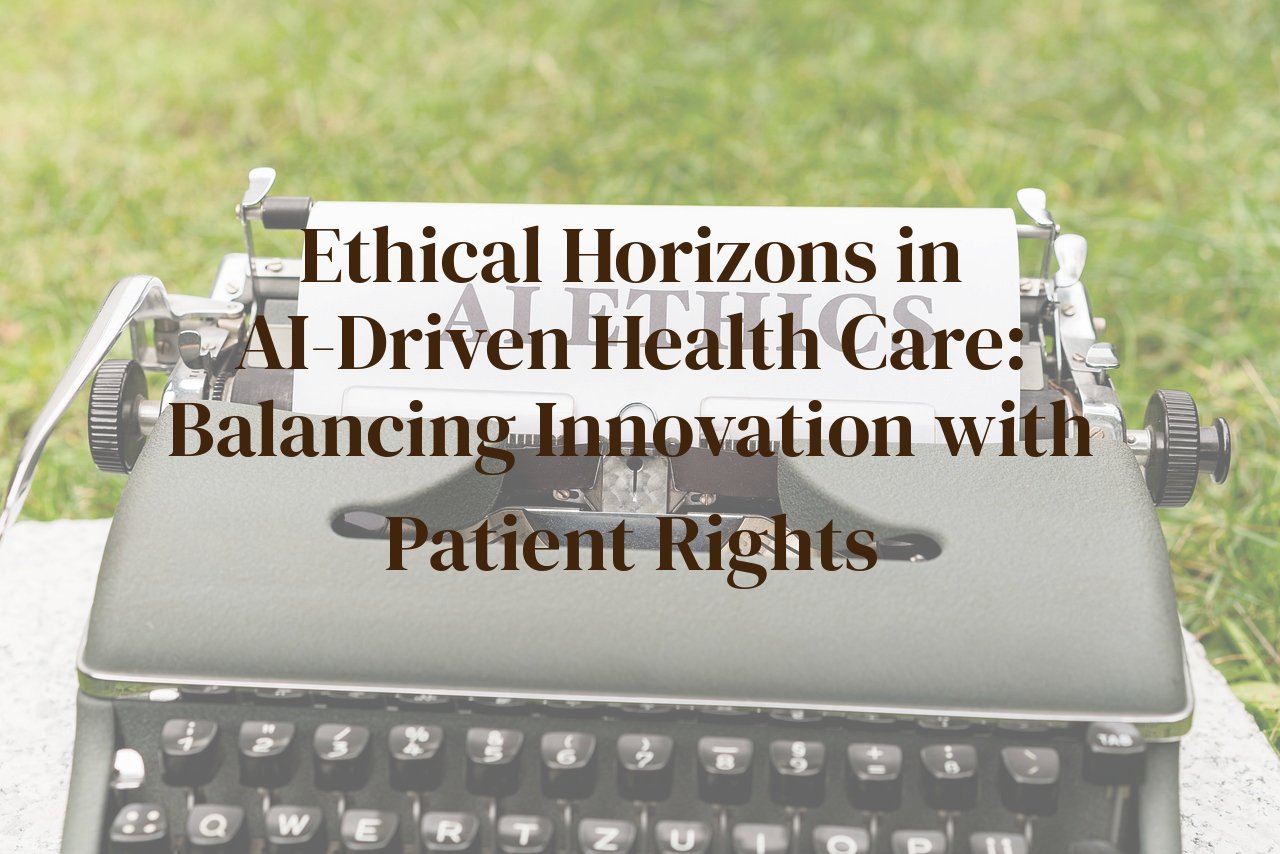
In an era where artificial intelligence (AI) is transcending into an indispensable tool for predictive healthcare, our blog post embarks on a thorough exploration of this technology’s ethical landscape. At the heart of this discussion stands patient privacy, a cornerstone that is as crucial as it is vulnerable in the expanse of AI application in medicine. This post will dissect the multifaceted ethical challenges we currently encounter and those we might face in the near future. Beyond the intricate web of patient data protection, we’ll navigate through the broader implications of AI’s predictive prowess in healthcare. By the end of this discourse, readers will gain nuanced insights into the intersection of AI advancements and ethical considerations, armed with knowledge to advocate for responsible innovation that honors the primacy of patient privacy and autonomy.
Table of Contents
The Vanguard of AI in Predictive Medicine: Possibilities and Pitfalls
Artificial Intelligence (AI) stands at the forefront of a transformative era in predictive medicine, heralding unprecedented capabilities. By assimilating vast datasets, AI algorithms can now detect subtle patterns that escape human scrutiny. These advanced systems offer the tantalizing promise of early disease diagnosis, personalized treatment plans, and the preemption of adverse medical events. The potential to revolutionize patient outcomes and streamline healthcare delivery is immense.
Nevertheless, the rapid progression of AI in healthcare is laced with complexities. One pressing concern revolves around the reliability of AI predictions. As machines train on data replete with biases, they may perpetuate these into their prognostications, leading to skewed or unjust medical interventions. Moreover, when AI interfaces with the multifaceted realm of human biology, the possibility of erroneous interpretations arises – misdiagnoses could potentially escalate, especially in the absence of robust oversight.
There are also ethical dimensions to ponder in the deployment of AI. As algorithms delve into intricacies of personalized data to predict health outcomes, we skate on the thin ice of privacy intrusion. While AI can unlock secrets buried within genetic codes or lifestyle patterns, there is an ever-present risk that such sensitive information could be misappropriated or compromised. Thus, safeguarding patient confidentiality becomes a Herculean task when balanced against the benefits of AI-driven analytics.
Another dimension to the AI implementation in predictive medicine is the socio-economic disparity it may exacerbate. With AI tools often being expensive and requiring significant infrastructure, there is a risk of creating a wider gap in healthcare quality between different societal strata. This is a profound pitfall that must be navigated with a commitment to equitable access to these advanced technologies.
Furthermore, as AI systems continue to evolve, the medical community must also evolve in its understanding and interaction with these tools. Physicians, for their part, must remain vigilant gatekeepers, contextualizing AI-generated predictions within the broader clinical picture. At the same time, they face the challenge of maintaining their diagnostic and decision-making skills in an age where reliance on technology could potentially devalue human expertise.
Patient Data in the Age of AI: An Ethical Quandary
The burgeoning role of Artificial Intelligence (AI) in predictive healthcare is both an exhilarating prospect and a source of ethical tension. As we step into an era where patient data can forecast health outcomes with staggering accuracy, the ethical quandary around privacy, consent, and trust intensifies. The intersection of data science and personal health information has summoned a complex landscape of both opportunity and risk.
On one hand, the detailed analysis of vast patient data repositories can unveil patterns that lead to early disease detection, personalized treatment plans, and even the identification of potential epidemics before they arise. Yet, this same power to dissect and predict can be viewed through a more ominous lens—where does the patient’s right to privacy begin and end in the AI continuum? In the quest to harness these predictive capabilities, healthcare providers must tread carefully, ensuring they do not inadvertently trample on individual rights.
The stratification of big data in healthcare has further complicated this ethical dilemma. Health information is no longer a static entity; it evolves in real time, with AI systems constantly learning and adapting. This dynamic nature poses a challenge for maintaining privacy, as traditional methods of consent are ill-equipped for the fluidity and scale of AI-driven data cycles. Patients might consent to one use of their data, not knowing that AI’s capabilities can extend that use into domains far beyond initial expectations.
Moreover, the potential for de-identification failure looms large. AI’s knack for pattern recognition means that even anonymized data can sometimes be re-identified, leading to breaches of confidentiality that can have devastating personal and professional consequences for individuals. The ethical frameworks that govern the use of AI in healthcare must address these challenges, ensuring that advanced algorithms are not given free rein over sensitive information without robust safeguards in place.
In conclusion, the ethical handling of patient data in the age of AI calls for both innovative approaches and a deepened commitment to patient rights. The solutions—be they technological, regulatory, or both—must be multifaceted, evolving alongside the AI systems they are designed to oversee. As professionals at the front lines of AI-driven healthcare, we must foster environments of transparency and trust, ensuring that the promise of AI is not tainted by the potential for ethical transgression.
The Fine Balance: AI Innovation vs. Patient Consent and Autonomy
The interplay between AI innovation in healthcare and the preservation of patient consent and autonomy is a labyrinthine dance of ethics, technology and human rights. As medicine strides into the future with artificial intelligence leading the way, healthcare professionals and patients alike are entangled in an intricate web of excitement and apprehension. The promise of AI’s predictive capabilities in medicine is shadowed by the spectre of compromised patient rights, wherein lies the crux of our ethical debate. We must tread this tightrope with care, evaluating both the glittering potential and the ethical costs.
AI’s advance into predictive medicine beckons a paradigm shift, where algorithms might foresee illnesses, tailor treatments, and perhaps sculpt the map of future healthcare itself. Yet, the coin has another side, where the same algorithms that whisper the secrets of our future health also hold the power to shatter the sanctity of our personal data. Patient autonomy and consent are not mere roadblocks to AI’s march but are fundamental human rights that must guide this journey. Nurses, doctors, and technologists must become the guardians of this right.
The blueprint for balancing AI with autonomy lies in fostering a culture of informed consent, where patients are not merely notified, but fully understand how their data will be used. Strategies to empower patient autonomy must evolve with the technology, ensuring that consent is not a one-time checkbox but a continuous conversation. Medical AI must wear a human face, one that sees patients as partners, not just data points. Only through this can we maintain the delicate equilibrium.
From an ethical standpoint, the architecture of AI systems in healthcare demands the integration of patients’ rights into their core design. Neither an afterthought nor a superficial add-on, patient autonomy should be the cornerstone of AI development in healthcare. This means algorithm transparency, accountability for data custodians, and a consistent reminder that behind every byte of data lies a human life whose dignity must never be compromised in the name of innovation.
The stage is set for a healthcare revolution, but as we harness the powers of AI, we must anchor our approach in the timeless values of medical ethics. The balance we seek is not a static one, but a dynamic equilibrium that respects the rhythms of technological advancement and the primacy of patient consent and autonomy. The journey is both an ethical challenge and a clinical opportunity, and we stand on the cusp of defining the future of healthcare for generations to come.
Preemptive Action in Protecting Privacy: Guidelines and Governance
The incursion of artificial intelligence into the healthcare landscape brings forth a pressing need to insulate the delicate weave of patient privacy. Within this domain, preemptive strategies are not simply recommended, they’re essential. To capably face the maelstrom of privacy concerns, a robust set of guidelines and governance structures need to be architected. These are not merely stopgaps but bulwarks against inadvertent erosions of trust and autonomy.
Firstly, implementing a data governance framework that enshrines the principles of privacy by design stands paramount. This tenet ensures that privacy considerations are not afterthoughts but foundational components in the development of AI healthcare solutions. From the encoding of anonymization protocols to the allocation of strict access controls, every layer of the technology stack must be scrutinized for potential vulnerabilities. It’s akin to constructing a digital fortress, with privacy being the cornerstone of this architectural marvel.
Equally crucial are the international and national regulations that serve as the codified conscience of the healthcare industry. Legislation such as GDPR in the European Union exemplifies the legislative rigor required to govern the management of sensitive health data. Ensuring compliance with such frameworks isn’t merely a legal checkpoint; it’s an ethical pact between technology purveyors and the populace they serve. Here, harmony between innovation and regulation doesn’t stifle growth but nurtures a sustainable ecosystem of trust.
Furthermore, the adoption of transparent and inclusive policymaking, involving a gamut of stakeholders from policymakers to patient advocates, ensures that the trajectory of AI healthcare is navigable and just. It is the equivalent of setting the compass of progress to align with the true north of patient rights. Within this collaborative theatre, the script is written such that every voice is a contributor to the final act.
To truly future-proof these ethical mandates, continuing education and awareness programmes are needed. They act as the sentinels of patient privacy, vigilantly adapting to the shifting sands of technological innovation. Empowering healthcare providers and patients alike with knowledge and tools to protect privacy forms the crux of an informed and responsive healthcare ecosystem.
With these measures, we can aim to foster an environment where artificial intelligence operates not as a rogue wave unsettling the ships of privacy but as a guiding wind—powerful, yet under command, ensuring that the healthcare journey is both innovative and intrinsically safe.
Futureproofing Healthcare: Strategies for Ethical AI Integration
As technology seamlessly intertwines with healthcare, futureproofing the latter requires a forward-thinking approach focused on upholding ethical practices in AI integration. The following strategies paint a picture of a robust health ecosystem where innovation and patient rights coalesce harmoniously, setting the stage for responsible evolution in medicine.
One bedrock strategy is the co-creation of ethics-based AI frameworks alongside technologists, ethicists, and healthcare professionals. This multidisciplinary engagement ensures that the tools developed are not only cutting-edge but also rooted in principles that honor privacy, consent, and patient dignity. Such collaborative blueprints would serve as guiding stars for current and future AI endeavors in healthcare settings.
Another vital measure is continuous ethics education for AI developers and healthcare practitioners. By infusing their technical expertise with an evergreen understanding of ethical imperatives, we can expect conscientious deployment of predictive models and algorithms that may otherwise venture into ethically murky territories.
Mandatory ethical audits for AI tools prior to their deployment could act as a safeguard against potential biases and violations. Institutionalizing these audits would require setting up independent bodies charged with the evaluation and certification of AI solutions against rigorous ethical standards.
To embody true patient-centered care, we need robust pathways for patient involvement in AI development. This could range from focus groups to governance roles, ensuring that the voice of the patient is not just heard but heeded. Patient advocacy groups might serve as liaisons, ushering in a new era where patients are active stakeholders in the AI tools that influence their health outcomes.
Transparency, along with explainability, is integral to ethical AI in healthcare. Releasing plain language summaries of AI functionalities and their potential implications for patient care can foster trust and understanding. Such transparency would make space for informed consent to take a meaningful shape, wherein patients are truly aware of what they are consenting to when they agree to AI-driven healthcare interventions.
Finally, a dynamic regulatory landscape that keeps pace with AI advancements is key. Regulations should not stifle innovation, but rather nurture it within the confines of moral responsibility. Adaptive policy frameworks that can respond to the rapid evolution of AI applications in healthcare will form the bedrock upon which patient trust and medical breakthroughs rest equally.
Conclusion
As we stand on the brink of a transformative epoch in healthcare, it becomes imperative that we take a measured approach to integrating AI in a manner that upholds ethical principles. The careful negotiation of innovation with patient privacy and consent is not just an academic exercise but a real-world necessity for maintaining trust in the healthcare system. Readers should emerge from this post with a robust framework of understanding that patient-centered ethics need not be forsaken at the altar of progress. Indeed, as we continue to chart this untrodden territory, ethical mindfulness will illuminate the path to a healthcare future where AI serves the humanity it’s designed to benefit.



